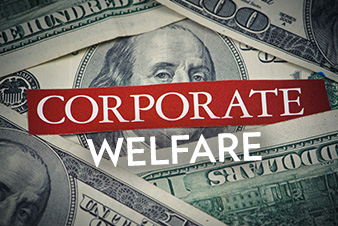Media

Corporate Welfare Is the Gift That Just Keeps Taking
Less than a year ago Pennsylvania’s state government offered Amazon billions in tax incentives to bring its HQ-2 location here. Amazon said no. But, when the commerce giant decided to open a new fulfillment center in Allegheny County after praising Pennsylvania as key to their ability to fulfill their shipping requirements for the region, the state was again ready with tax credits. This time $1.6 million.
But why would a mere $1.6 million tax incentive sway the third biggest company in the world to expand in Pennsylvania when several billion could not? The answer: it wouldn’t.
According to a study from the Upjohn Institute for Employment Research, tax incentives only influence decisions such as a business’ location in about 2-25% of the time. In Pennsylvania, the Independent Fiscal Office (IFO) found that 95% of jobs that benefited from a job creation tax credit would have been created regardless.
In other words, Amazon is collecting taxpayer funded rewards for decisions they would have made anyways.
Regardless of this evidence, Pennsylvania keeps giving away citizens' money. In the 2019-20 budget year, Pennsylvania will spend over $729 million on incentives, otherwise known as corporate welfare. This number represents a slight reduction from last year but is still a substantial burden.
Chart: Spending on Corporate Welfare 2019-20
Another example is the Film Production Tax Credit, which will total $70 million this year. A report by the Independent Fiscal Office found that for every dollar in credit, the Commonwealth receives only $0.14 in economic activity. Put another way, this tax credit will lose the Commonwealth over $60 million in 2019-20.
Pennsylvania must stop these wasteful schemes. Instead of giving well-lawyered or huge multinationals special treatment, why doesn’t our state government do what’s fair and give every single business in Pennsylvania a bit of a break? Not only does the mom and pop shop down the street deserve to at least pay the same taxes as Amazon, they deserve to not pay one of the highest business taxes in the nation.
If Pennsylvania were to eliminate its corporate welfare, the savings could be used to reduce the corporate net income tax (CNIT) by more than 2 percentage points from 9.99% to 7.84%, and take the state from the third highest tax to the 16th. A high CNIT is like a ball and chain on a state economy. Its reduction is shown to increase investment, increase jobs, and spur economic growth.
If Pennsylvania’s political leaders want to boost our state’s economic growth and ensure workers have good jobs, then they need to try something new. Reducing the state’s CNIT rate through cutting corporate welfare along with comprehensive state tax reform is the answer.